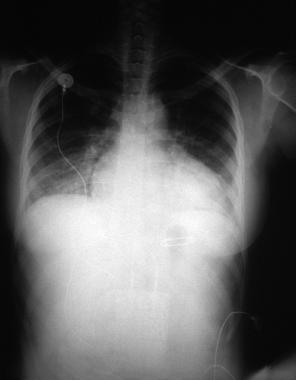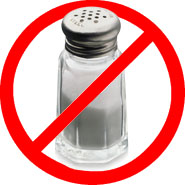Hypertension affects approximately 75 million adults in the United States and is a major risk factor for stroke, myocardial infarction, vascular disease, and chronic kidney disease. See the image below.

Anteroposterior x-ray from a 28-year old woman who presented with congestive heart failure secondary to her chronic hypertension, or high blood pressure. The enlarged cardiac silhouette on this image is due to congestive heart failure due to the effects of chronic high blood pressure on the left ventricle. The heart then becomes enlarged, and fluid accumulates in the lungs, known as pulmonary congestion.
Essential update: Study finds significant increase in US emergency room visits for hypertension
Between 2006 and 2011, there was a 25% increase in the number of people visiting US emergency rooms for essential hypertension, according to a new analysis of data from the Nationwide Emergency Department Sample. The reason for the increase, however, remained uncertain. The rate of emergency department visits also increased significantly, according to the study, rising from 190.1 visits per 100,000 population in 2006 to 238.5 visits per 100,000 population in 2011. Over the same period, however, admission rates decreased, from 10.47% in 2006 to 8.85% in 2011.
Emergency department visits for hypertension with complications and secondary hypertension also rose, from 71.2 per 100,000 population in 2006 to 84.7 per 100,000 population in 2011, while again, admission rates fell, dropping from 77.79% in 2006 to 68.75% in 2011. The in-hospital mortality rate for admitted patients dropped as well, from 1.95% in 2006 to 1.25% in 2011.
Signs and symptoms
Hypertension is defined as a systolic blood pressure (SBP) of 140 mm Hg or more, or a diastolic blood pressure (DBP) of 90 mm Hg or more, or taking antihypertensive medication.
Based on recommendations of the Seventh Report of the Joint National Committee on Prevention, Detection, Evaluation, and Treatment of High Blood Pressure (JNC 7), the classification of BP for adults aged 18 years or older has been as follows :
- Normal: Systolic lower than 120 mm Hg, diastolic lower than 80 mm Hg
- Prehypertension: Systolic 120-139 mm Hg, diastolic 80-89 mm Hg
- Stage 1: Systolic 140-159 mm Hg, diastolic 90-99 mm Hg
- Stage 2: Systolic 160 mm Hg or greater, diastolic 100 mm Hg or greater
Hypertension may be primary, which may develop as a result of environmental or genetic causes, or secondary, which has multiple etiologies, including renal, vascular, and endocrine causes. Primary or essential hypertension accounts for 90-95% of adult cases, and secondary hypertension accounts for 2-10% of cases.
Diagnosis
The evaluation of hypertension involves accurately measuring the patient’s blood pressure, performing a focused medical history and physical examination, and obtaining results of routine laboratory studies. A 12-lead electrocardiogram should also be obtained. These steps can help determine the following:
- Presence of end-organ disease
- Possible causes of hypertension
- Cardiovascular risk factors
- Baseline values for judging biochemical effects of therapy
Other studies may be obtained on the basis of clinical findings or in individuals with suspected secondary hypertension and/or evidence of target-organ disease, such as CBC, chest radiograph, uric acid, and urine microalbumin.
Management
Many guidelines exist for the management of hypertension. Most groups, including the JNC, the American Diabetes Associate (ADA), and the American Heart Association/American Stroke Association (AHA/ASA) recommend lifestyle modification as the first step in managing hypertension.
Lifestyle modifications
JNC 7 recommendations to lower BP and decrease cardiovascular disease risk include the following, with greater results achieved when 2 or more lifestyle modifications are combined:
- Weight loss (range of approximate systolic BP reduction [SBP], 5-20 mm Hg per 10 kg)
- Limit alcohol intake to no more than 1 oz (30 mL) of ethanol per day for men or 0.5 oz (15 mL) of ethanol per day for women and people of lighter weight (range of approximate SBP reduction, 2-4 mm Hg)
- Reduce sodium intake to no more than 100 mmol/day (2.4 g sodium or 6 g sodium chloride; range of approximate SBP reduction, 2-8 mm Hg)
- Maintain adequate intake of dietary potassium (approximately 90 mmol/day)
- Maintain adequate intake of dietary calcium and magnesium for general health
- Stop smoking and reduce intake of dietary saturated fat and cholesterol for overall cardiovascular health
- Engage in aerobic exercise at least 30 minutes daily for most days (range of approximate SBP reduction, 4-9 mm Hg)

Reduce sodium intake to no more than 100 mmol/day (2.4 g sodium or 6 g sodium chloride; range of approximate SBP reduction, 2-8 mm Hg)
The AHA/ASA recommends a diet that is low in sodium, is high in potassium, and promotes the consumption of fruits, vegetables, and low-fat dairy products for reducing BP and lowering the risk of stroke. Other recommendations include increasing physical activity (30 minutes or more of moderate intensity activity on a daily basis) and losing weight (for overweight and obese persons).
The 2013 European Society of Hypertension (ESH) and the European Society of Cardiology (ESC) guidelines recommend a low-sodium diet (limited to 5 to 6 g per day) as well as reducing body-mass index (BMI) to 25 kg/m2 and waist circumference (to < 102 cm in men and < 88 cm in women).
Pharmacologic therapy
If lifestyle modifications are insufficient to achieve the goal BP, there are several drug options for treating and managing hypertension. Thiazide diuretics are the preferred agents in the absence of compelling indications.
Compelling indications may include high-risk conditions such as heart failure, ischemic heart disease, chronic kidney disease, and recurrent stroke, or those conditions commonly associated with hypertension, including diabetes and high coronary disease risk. Drug intolerability or contraindications may also be factors. An angiotensin-converting enzyme (ACE) inhibitor, angiotensin receptor blocker (ARB), calcium channel blocker (CCB), and beta-blocker are all acceptable alternative agents in such compelling cases.
The following are drug class recommendations for compelling indications based on various clinical trials:
- Heart failure: Diuretic, beta-blocker, ACE inhibitor, ARB, aldosterone antagonist
- Postmyocardial infarction: Beta-blocker, ACE inhibitor, aldosterone antagonist
- High coronary disease risk: Diuretic, beta-blocker, ACE inhibitor, CCB
- Diabetes: Diuretic, beta-blocker, ACE inhibitor, ARB, CCB
- Chronic kidney disease: ACE inhibitor, ARB
- Recurrent stroke prevention: Diuretic, ACE inhibitor
Source emedicine.com
DUC TIN SURGICAL CLINIC
Tin tức liên quan

Performance diagnostique de l’interféron gamma dans l’identification de l’origine tuberculeuse des pleurésies exsudatives

A Mixed Phenotype of Airway Wall Thickening and Emphysema Is Associated with Dyspnea and Hospitalization for Chronic Obstructive Pulmonary Disease.

Radiological Approach to Asthma and COPD-The Role of Computed Tomography.

Significant annual cost savings found with UrgoStart in UK and Germany

Thrombolex announces 510(k) clearance of Bashir catheter systems for thromboembolic disorders
Phone: (028) 3981 2678
Mobile: 0903 839 878 - 0909 384 389







